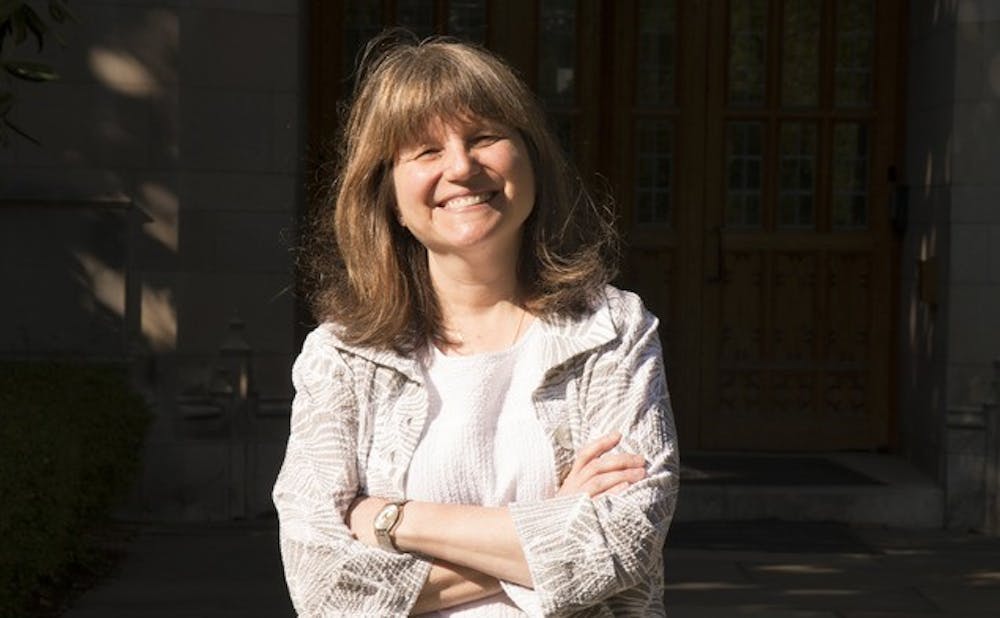Duke's 54 majors, 52 minors and 21 certificate programs can make getting familiar with the University's academic environment overwhelming.
Few understand that better than Provost Sally Kornbluth, who is starting her second year as Duke's chief academic officer after spending eight years as vice dean for basic science at the School of Medicine.
Kornbluth said her first year as provost was focused on learning about the "incredibly complex maze" that is the University's academic structure, but now she is ready to start making her mark. Near the top of her list of priorities is simplifying the curriculum to give students a clearer path to what they wish to study.
"It has taken me a year to learn about all of the many offerings so I can imagine when freshmen come in, they’re pretty overwhelmed by the options," Kornbluth said.
Overseeing the updates to the University's advising system—which are being led by Steve Nowicki, dean and vice provost for undergraduate education—is another project Kornbluth hopes to focus on in year two.
She aims to complete a draft of the next strategic plan—Duke's first since 2006—by summer 2016 and implement the recommendations of task forces on faculty diversity and master's degrees.
"In a lot of ways, year one was planning and preparatory to the things that we really have to deliver on this year," Kornbluth said.
Although Kornbluth is not directly involved with the ongoing Arts and Sciences Council review of Curriculum 2000, she is "watching with anticipation." She noted that she hopes to see a simplification of the Trinity curriculum and more opportunities for students to "go more deeply" and take more risks academically.
Specific examples Kornbluth provided to achieve those goals were increasing the number of pass/fail courses and implementing a week-long academic experience during Spring Break—which is being discussed as an ungraded course to deepen student interest in a topic.
Rather than adding more interdisciplinary programs, the priority should be finding notable connections between existing programs such as Bass Connections, DukeEngage and Focus and the University's curricular offerings, Kornbluth explained, noting that Bass Connections was recently aligned more closely with Duke's institutes and centers.
Kornbluth herself is working on a connection between the School of Medicine and the University's other academic programs as part of a "quantitative sciences push" she hopes to initiate. Activities related to data analysis and medicine are already taking place, but discussions are occurring with Dr. A. Eugene Washington, chancellor for health affairs and president and CEO of Duke University Health System, "to bridge from the campus to the medical side," Kornbluth said.
"[Kornbluth] has just been an exemplar of the kind of leader that I would want to partner with to drive cross-campus initiatives for a host of reasons," Washington said. "One, because she’s just so bright, insightful and smart, two, she knows our enterprise having been dean, and now she also knows the campus side. I feel like I have a great partner there."
Details about the initiatives cannot be made public yet, Kornbluth explained, but she said that multiple announcements will be made in the coming months.
In addition to focusing on the academic landscape, Kornbluth is heavily involved with the many moving parts in the University's administration. She has worked closely with Washington, Valerie Ashby, dean of the Trinity College of Arts and Sciences, and Denis Simon, executive vice chancellor of Duke Kunshan University, since their recent arrivals, but is also part of several ongoing searches.
Duke is currently looking for a new dean of the Pratt School of Engineering, new dean of the Divinity School and new director of the Duke Institute for Brain Sciences.
"The careful selection of leaders makes so much of a difference," Kornbluth said. "Someone really good can have a fantastic impact, and someone not so good can make things a lot more difficult. I’m highly motivated to find the absolute best person for all of these positions.”
Although she has several of her own ideas entering year two, Kornbluth is hoping to continue using input from students and faculty to inform decisions about the future academic landscape, adding that she wants students and faculty to feel comfortable approaching her when they have ideas.
"My job is to create a fertile environment and help catalyze new directions, and only on rare occasions to step in with specific top-down initiatives," Kornbluth said. "In general, we really want to leverage the enthusiasm and expertise of our faculty and students—that’s where the new ideas come from."
Get The Chronicle straight to your inbox
Sign up for our weekly newsletter. Cancel at any time.

